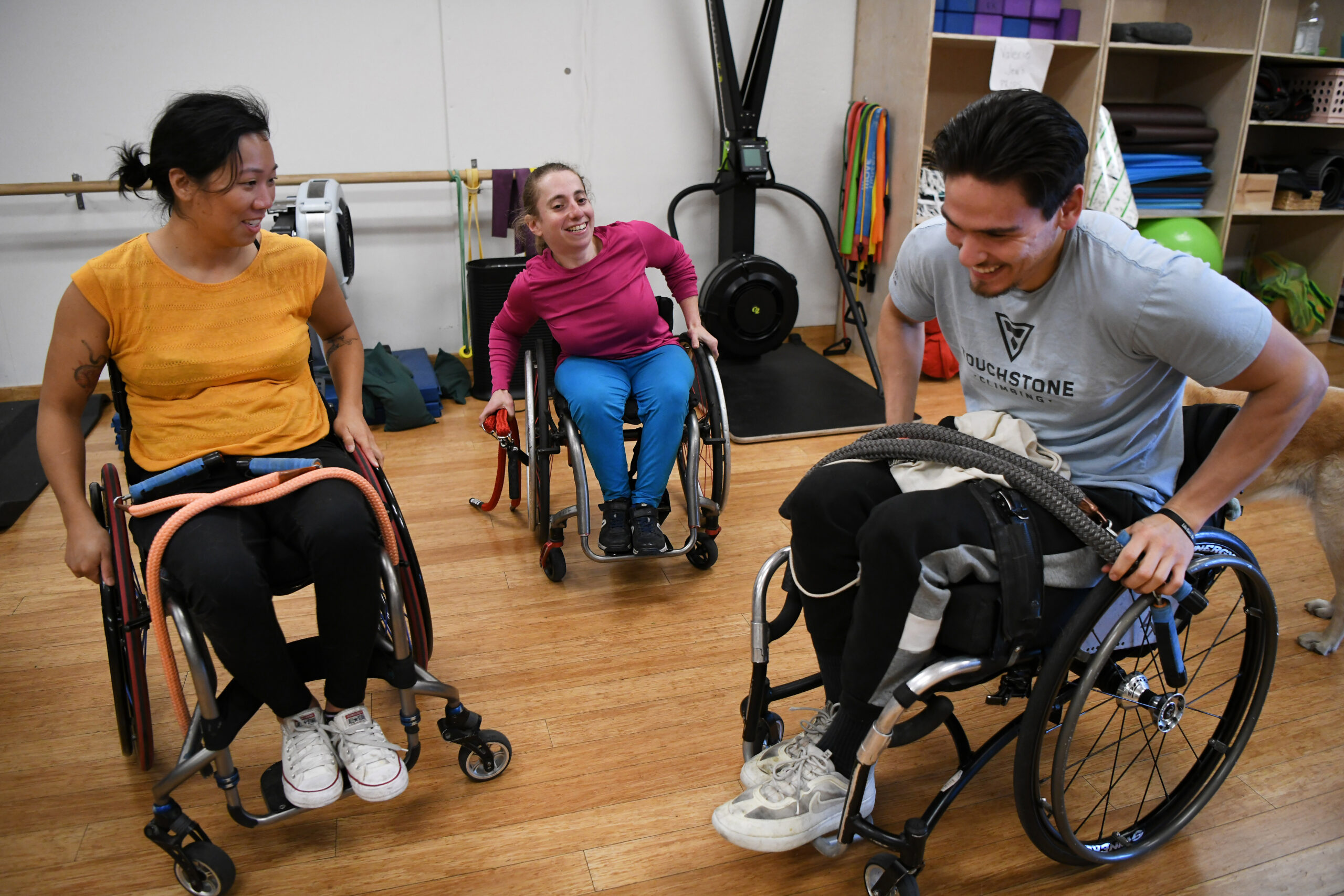Jorge Macias is rarely in one place for long, with the 24-year-old wheelchair user an active and upbeat presence among the many Bay Area Outreach and Recreation Program (BORP) Adaptive Sports and Recreation program activities.
Whether it is rock climbing, wheelchair basketball or any of the program’s other activities around Berkeley, Macias specializes in making newcomers with various disabilities feel welcome.
“It’s amazing to see the way people grow and expand from these programs,” Macias said. “I’ve gotten to meet some of the shyest people, and they’ve grown to be very confident, strong people.”
BORP, an East Bay organization that has helped people with disabilities stay active through activities and sports for nearly a half-century, has served 1,057 people over the past year. The equipment needed to make this possible is often expensive. A wheelchair suitable for basketball, for example, can cost thousands of dollars.
BORP is seeking $10,000 through the East Bay Times’ Share the Spirit program, which provides relief, hope and opportunities for East Bay residents by helping raise money for nonprofit programs in Alameda and Contra Costa counties. The funds will be used to support more than 2,000 hours of fitness classes for individuals with physical and vision disabilities.

“For our programs to run, we rely on generous donors to keep our programs going,” executive director Emily Seelenfreund said. “Not only are our programs beneficial to the individual, but they’re good for society as well. They really help integrate people with disabilities and help them live meaningful and integrated lives.”
Macias is living proof. In 2016, he was paralyzed from the chest down after being shot three times during an attempted robbery near his family’s Pittsburg home, becoming one of approximately 3 million Americans who use a wheelchair, according to statistics published by the Bureau of Transportation.
Faced with a sobering new reality, the teenager wanted to take refuge in weightlifting, an activity he enjoyed at the gym before his injury. He assumed that was a place where he could feel comfortable. But he was wrong.
“I would feel like everyone was staring at me and I would get social anxiety,” he said. “That made me stay home even more. It was mostly staying home, going to school, and locking myself in my room.”
Though his family was extremely supportive, for which he is thankful, Macias saw obstacles at times while being isolated.
“I know that some people see that as a blessing, and of course it is,” Macias said about family support. “But I also had to show them that I could be independent. That was a barrier we had to cross.”
Sick of the rut he found himself in after a year, Macias forced himself to get out.
“I hit rock bottom,” Macias recalled. “I was like, ‘This has to stop, you have to go out. You have to do in-person classes. Forget these virtual classes. You have to now also do sports, and grow and expand yourself. It’s not over.’”
A friend had been telling him about BORP for months. Once he saw what the Berkeley nonprofit had to offer, Macias was hooked.
Somewhat ironically, his first exposure to the program was through basketball, a sport he did not enjoy.
“Before my injury, I hated sports and I sucked at basketball. People would tell me I was tall for no reason,” Macias remembered.
But what started as one trip for a game of hoops became so much more. It became weeks chock-full of cycling and rock-climbing classes.
In the process Macias discovered a community that understood what he had been through.
“You’re actually in a place where you don’t feel like you’re the only one who exists this way,” Macias said. “You don’t feel like the odd one out. You feel included, like you’re part of a family.”

He also learned that cycling was an activity he and his family could enjoy together.
“As soon as I got my injury, I thought doing things with my family was kind of over, like I would have to do my own things, and they had to do their own things,” Macias remembered. “But cycling provides that opportunity.”
By 2021, Macias had spent so much time with BORP, as both a participant and volunteer, that he felt comfortable applying for a job there.
“If you have ever played a sport, you know the impact it can have not just physically, but the emotional and mental aspect is very important,” Macias said. “It could basically change you from a very isolated, depressed person to a very determined and very disciplined person.”
As a program associate, Macias teaches a “fitness for all” class and conducts outreach visits to rehabilitation hospitals showcasing BORP and the benefits of its programs. Benefits that go far beyond sports.
“Things that would seem impossible in the beginning, for example, a transfer from your car seat, they’re like, ‘You know what, I could do that a lot easier now,’” Macias said.
Macias’ enthusiasm and ability to connect with others has helped hundreds of people who have come through BORP’s doors in Berkeley.
“I think people are really drawn to Jorge,” Seelenfreund said. “If there’s a new person who comes to the gym, I often direct them to Jorge because he provides just a safe and welcoming environment for people who are new to the sport. He’s really just passionate about meeting people who are at their level.”
Macias now lives on his own, travels, and plans to go to college to study recreational therapy. He sees his job as a way to get experience in the field.
“Our stories may be very sad or depressing, but that is not the person’s whole life,” Macias said. “It could always change. It’s always up to that person to determine their life. Just because a person had a tragic incident, that doesn’t mean that’s going to be the rest of their life.”
